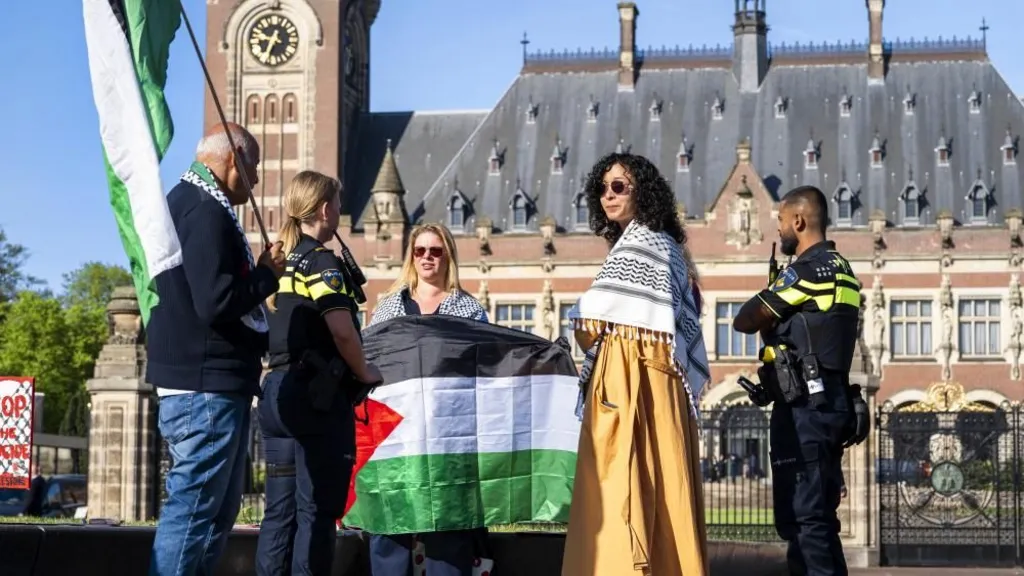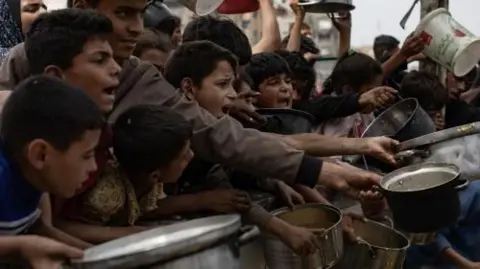
 EFE
EFEThe UN's top court, the International Court of Justice (ICJ), has begun hearings for an opinion on Israel's legal duty to allow aid to Palestinians and to co-operate with the UN's Palestinian aid agency, Unrwa – both of which Israel has barred in Gaza.
Israel stopped allowing aid into Gaza on 2 March, which it said was to pressure Hamas into releasing hostages. The UN and aid agencies say food and supplies are running out in Gaza, which Israel denies.
Last year Israel severed ties with Unrwa, accusing it of colluding with Hamas.
The hearings at The Hague are expected to last for five days, though a ruling could take many months.
Ammar Hijazi, the Palestinian ambassador to International Organisations in The Hague, opened the hearings with a disturbing and graphic testimony.
He accused Israel of a "genocidal campaign" against the Palestinians, adding that Israel's "crimes" put Palestinians at risk of irreparable harm.
The Palestinian ambassador to the United Nations, Riyad Mansour, at times his voice breaking, hands shaking, told the judges it has "never been more painful to be Palestinian".
He said Israel was seeking "deliberately to deprive the population in Gaza" to ensure it has "no way to survive" and that people were "trapped between death and displacement".
He described Unrwa as a "shining example of multilateralism at the UN" and called for a place where Palestinian families could be "reunited in life rather than death".
In a statement coinciding with the start of the hearings, Israel's Foreign Minister Gideon Saar said it had decided "not to take part in this circus".
"It is another attempt to politicise and abuse the legal process in order to persecute Israel," he said.
Israel won't be among the 39 countries speaking at the ICJ this week, but has provided a 37-page written submission to the court, in which it outlines the ways in which it claims Unrwa has been infiltrated by Hamas and argues that Israel is entitled to end cooperation with the organisation for the sake of its own security.
The only countries likely to defend Israel in court are the US and Hungary.
At issue are two bills passed by Israel's parliament in October that declared Unrwa harboured terrorists, and ordered the government to end all co-operation and contact with the organisation, including the supply of visas to Unrwa international employees.
Unrwa has challenged Israel's allegation that it knowingly has Hamas members in its ranks, or that it co-operated with the armed group.
The focus of these hearings is to aid the judges in answering the question posed by the UN General Assembly, specifically whether Israel acted unlawfully in overriding the immunities and privileges of a UN body. But with statements live-streamed around the world from the Peace Palace, home to the ICJ in the Hague - the process is being used to highlight the wider concerns and context.
In December, a vast majority of countries at the UN General Assembly voted to get the ICJ involved for a definitive interpretation of the law and Israel's obligations.
Since then, the humanitarian situation in Gaza has got worse.
Two weeks after cutting off aid, a ceasefire which had offered some respite for Gazans since January collapsed when Israel resumed its military offensive. Israel and Hamas blamed each other for the end of the truce.
The current Israeli blockade is the longest closure Gaza has ever faced.
The UN says Israel - as an occupying power - is obliged under international law to ensure supplies for the 2.1 million Palestinians in Gaza.
Israel says it is complying with international law and there is no aid shortage.
 EPA
EPAThat's something disputed by a number of humanitarian relief organisations operating on the ground in Gaza.
At the end of March, all 25 bakeries supported by the World Food Programme (WFP) there were forced to close after wheat flour and cooking fuel ran out.
According to the UN, malnutrition is spreading.
The UN Office for the Co-ordination of Humanitarian Affairs (Ocha) says there are also severe shortages of medicine, medical supplies and equipment for hospitals overwhelmed by casualties from the Israeli bombardment, and that fuel shortages are hampering water production and distribution.
The WFP warned food prices had skyrocketed by up to 1,400% compared to during the ceasefire, and the shortages of essential commodities raised serious nutrition concerns for vulnerable populations, including children under five, pregnant and breastfeeding women, and the elderly.
Earlier this month, the head of Unrwa said a "man-made famine" was "tightening its grip" across Gaza.
Human rights groups argue that Israel is using the aid blockade as a form of collective punishment and as political leverage in hostage release negotiations.
Hamas is holding 59 hostages, taken when it attacked Israel on 7 October 2023, killing about 1,200 people. Israel responded with a massive military campaign, which has killed at least 52,243 Palestinians, according to Gaza's Hamas-run health ministry.
France, Germany and the UK described the blockade as "intolerable" and condemned as unacceptable remarks by the Israeli Defence Minister, Israel Katz, linking the supply of aid to political pressure on Hamas.
The Israeli foreign ministry said more than 25,000 lorries carrying almost 450,000 tonnes of aid had entered Gaza during the ceasefire, adding: "Israel is monitoring the situation on the ground, and there is no shortage of aid in Gaza."
It also said Israel was not obliged to allow in aid because Hamas had "hijacked" supplies "to rebuild its terror machine".
Hamas has previously denied stealing aid and the UN has said it has kept "a very good chain of custody on all the aid it's delivered".
The WFP says more than 116,000 tonnes of food supplies - enough to feed one million people for up to four months - is positioned at aid corridors and is ready to be delivered as soon as Israel reopens Gaza's border crossings.
Palestinian ambassador to the UN, Mansour, warned the judges that "people are starving" while "food rots at the border".
The hearings represent the biggest test of Israel's compliance with international law since the ICJ's landmark rulings in January, March and June of 2024 that ordered it to take immediate steps to allow aid to enter Gaza unrestricted and unhindered.
The UN has argued blocking Unrwa amounts to a violation of the Palestinians inalienable right to self-determination.
The ICJ judges' advisory opinion is expected within months.